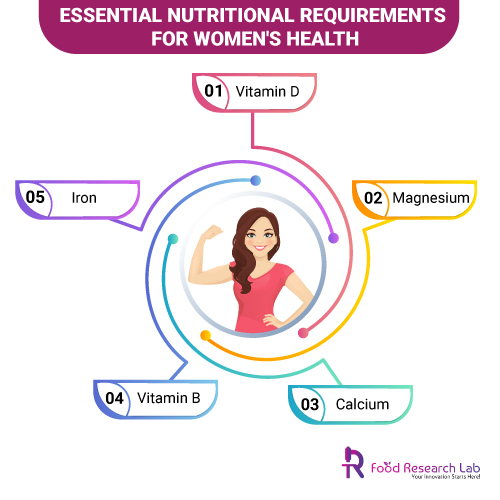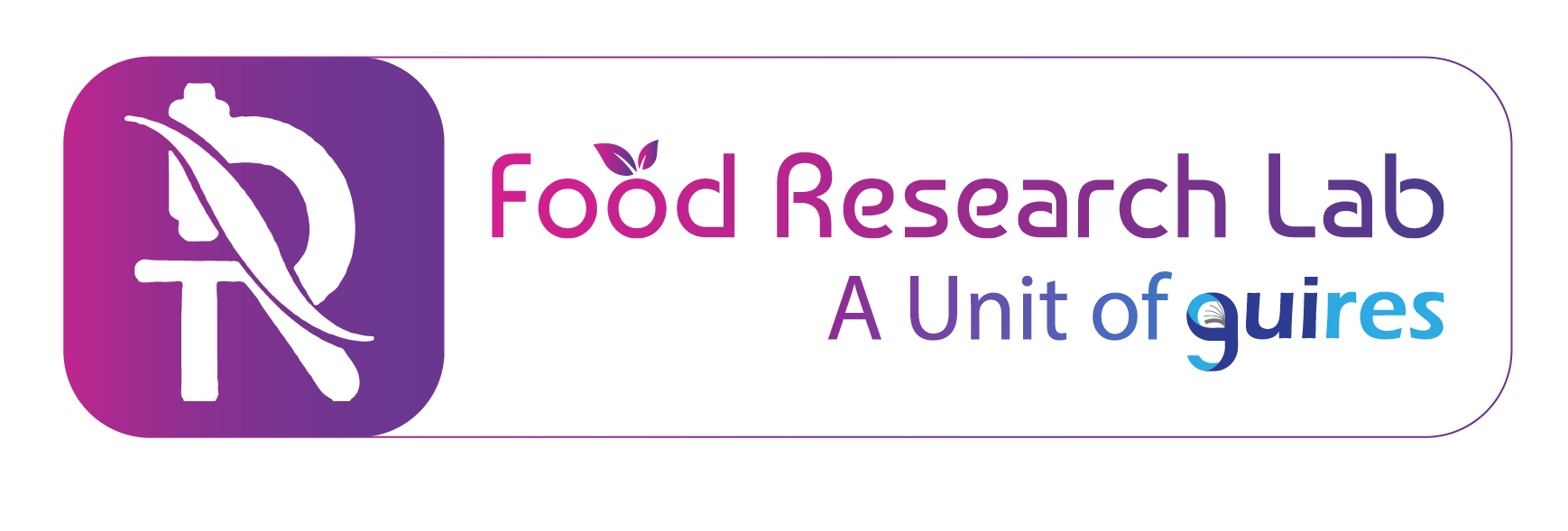
Essential Nutritional Requirements For Women’s Health
Health Benefits Of Nutritional Foods For Women
Vitamins and minerals are a necessary element of one’s health journey, as we all know, and they are the fundamentals of a fit and healthy body. No matter how hard we try to add all of the necessary elements to a dish to make it nutritious, we will not obtain all its nutrients. This is where dietary supplements play a big role in our daily lives. Food formulation and development play a major role in food processing to develop foods that provide nutrition for women.

- Vitamin D: Vitamin D is vital for bone and cell formation and helps our systems absorb calcium. In their latter years, women’s bone mass and strength deteriorate. Vitamin D may be found in abundance in the sun. As a result, vitamin D is critical for calcium balance in the body.
The RDA for vitamin D provides the daily magnitude required to maintain healthy bones and good calcium metabolism in healthy persons, and it is presumptively sun-protected.
RDA: The Recommended Dietary Allowance (RDA) for adults 19 and older is 600 IU per day for males and women and 800 IU per day for people >70 years. The Tolerable Upper Consumption Level (UL) is the highest daily intake that is unlikely to affect one’s health. For adults and children aged ten and above, the UL for vitamin D is 4,000 IU.
- Magnesium:
Magnesium offers several rewards. It relieves stress, supports a healthy sleep cycle, lowers blood pressure, and toughens the immune system. Magnesium should be a part of your daily diet. Magnesium also relieves leg cramps in pregnant women and eases PMS symptoms.
For people aged 19 to 51 years, the RDA is 400-420 mg per day for men and 310-320 mg per day for women. Pregnancy necessitates 350-360 mg per day, whereas nursing requires 310-320 mg.
- Calcium: Calcium helps in the upkeeping of bone density in the body, and it helps to maintain your bones and teeth healthy. According to evidence, women are four times more likely than men to develop osteoporosis. Thus, calcium consumption is perilous. After menopause, doctors advise women to take calcium supplements. For women aged 19 to 50, the RDA for calcium is 1,000 milligrammes per day; for women aged 51 and over, it is 1,200 milligrammes per day. The RDA for pregnant and nursing women is 1,000 mg. The RDA for males aged 19 to 70 is 1,000 mg, while for men aged 71 and more is 1,200 mg.
- Vitamin B, sometimes known as an energizer, is a multivitamin. Vitamin B gives women the energy to go through their daily schedules, whether working out or doing household tasks. Vitamin B is also a vital component for pregnant women since it aids in developing the foetal brain. As a result, vitamin B is essential for women’s vitality. Vitamins are a major source of food fortification in functional foods for health and wellness.
- B1 (thiamin)
- B2 (riboflavin)
- B3 (niacin)
- B5 (pantothenic acid)
- B6 (pyridoxine)
- B7 (biotin)
- B9 (folate [folic acid])
- B12 (cobalamin)
- Iron supports the body to produce oxygen, maintains a healthy immune system, and mends cognitive function, among other things. Associated with males, women require more iron due to the loss during their menstrual cycle. Women must take enough iron; a lack of iron causes anaemia. Functional food product developments such as an iron-rich bar or malt fortified with iron
For individuals aged 19 to 50, the RDA is 18 mg for women, 27 mg for pregnancy, and 9 mg for breastfeeding. The greater levels in women and during pregnancy are related to blood loss during menstruation and the baby’s fast development, requiring more blood circulation. Adolescents 14 to 18 years old who are majorly growing need more iron: 11 mg for boys, 15 mg for girls, 27 mg for pregnancy, and 10 mg for breastfeeding. With the premise that menopause has caused in the end of menstruation, the RDA for women 51 and older lowers to 8 mg. It’s worth observing that some women experience menopause later than others. Therefore, they should stick to the RDA for younger women until menopause is verified.
Ensure that your food is likewise healthy and well-balanced when consuming your multivitamin tablets. If they take appropriate multivitamins, women will live a nutritional, quality, and affluent life.
Conclusion
These are the top five nutrients a woman should consume for optimal health. There are other aspects of optimal health, similar to eating processed food. Food Research Lab can aid food companies to develop functionally rich food products fortified with elements for women’s health. We also provide dietary supplements consulting to improve the health of individuals.





